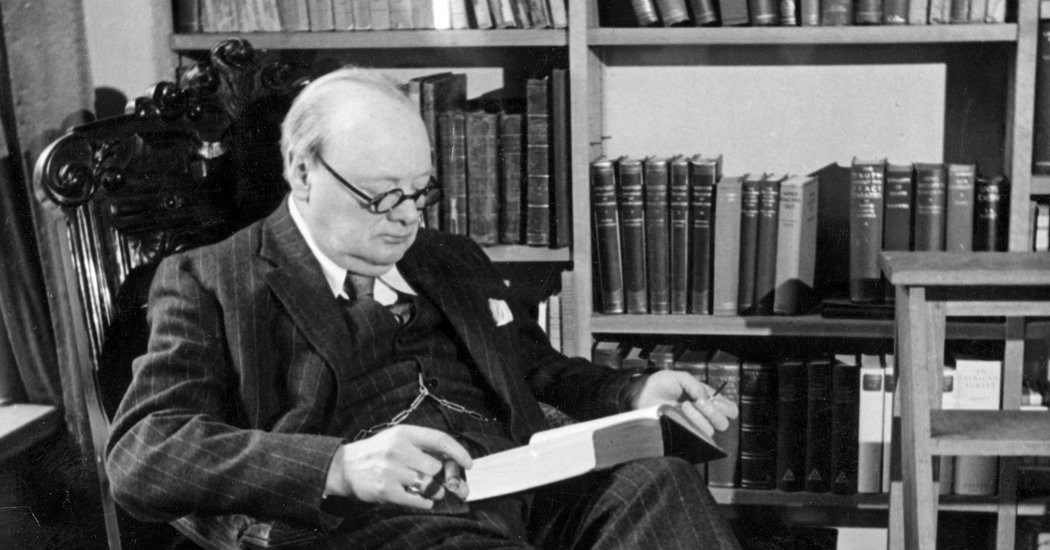It’s now mid-June as I write this, but as of June 1, 2018, I had completed the first 15 books in my 30-book reading challenge for 2018, meaning I am already half way to my goal with 7 months to spare. As mentioned in a previous blog post, between January and February, I read 8 books, which I reviewed in that post. Between March and May, I read 7 books. However, four of those seven books were not on my original list – somehow some new books got my attention and “snuck” onto my reading list. But this is sort of what I expected was going to happen.
I picked up a print copy of Strength to Love by Martin Luther King, Jr. while I was in Memphis in April for an event commemorating the 50th anniversary of MLK’s assassination in that city. I began reading What I Saw in America (via iBooks on my iPad) by G.K. Chesterton as part of a Chesterton Society book club I joined earlier this year here in Orlando. We read it in two parts and discussed it at the April and May meetings. My NRI colleague, Kathryn Jean Lopez, a religion writer for National Review gifted me a printed copy of the book, Conversion: Spiritual Insights Into an Essential Encounter with God. It came during Lent and I picked it up and read it slowly over about two months. I can say it arrived really timely as I was really starting to dive deeper into my faith and this book helped me go even further.
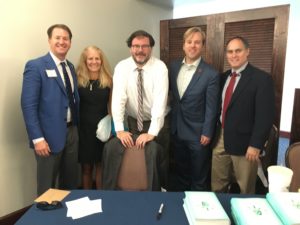
Finally, Suicide Of The West by my NRI colleague Jonah Goldberg was released in late April at #4 on the New York Times bestseller list. I wasn’t sure I’d get to this book so soon, but it is an incredible book and I’ve been fortunate to be there for five major talks by Jonah about this book (in Texas and Florida) as well as a few other private conversations. Even though it is a hefty book, I’m glad I chose to read it in print.
The other books I read during this time of year included three books that were on my original list for 2018: Made to Stick (print), American Pravda (Audible), and the lengthy biography on Winston Churchill, The Last Lion (Audible).
I’ve included a synopsis on each of these seven books below. Collectively, these seven books are really full of great ideas I took away from amazing leaders: Martin Luther King, Jr, G.K. Chesterton, Jonah Goldberg, James O’Keefe, Father Donald Haggerty, Winston Churchill, and the dual authors of Made to Stick, Chip Heath and Dan Heath. They each filled me with their incredible insights: on faith, love, civilization, journalism, leadership, and making ideas stick. They all found a way to make their own ideas stick on me. And I hope you will consider reading at least one of them as well.
Made to Stick: Why Some Ideas Survive and Others Die 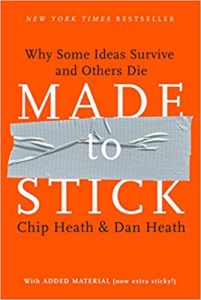 by Chip Heath and Dan Heath, published in 2008. This book was given to me over two years ago, by my former colleagues Bill and Jill Mattox, when I was making my move to Orlando. I’m grateful for this gift and I can see why they got it for me. Like Bill, I am full of ideas. But it’s not simply about having ideas but making them stick. When we have an idea or want to share a subject matter we care about, we can be haunted by “The Curse of Knowledge,” meaning we know too much about the subject and probably talk about it in the wrong way. What we have to do is adjust that message to an intended audience so they will not only understand it, but remember it, and perhaps be captivated by it.
by Chip Heath and Dan Heath, published in 2008. This book was given to me over two years ago, by my former colleagues Bill and Jill Mattox, when I was making my move to Orlando. I’m grateful for this gift and I can see why they got it for me. Like Bill, I am full of ideas. But it’s not simply about having ideas but making them stick. When we have an idea or want to share a subject matter we care about, we can be haunted by “The Curse of Knowledge,” meaning we know too much about the subject and probably talk about it in the wrong way. What we have to do is adjust that message to an intended audience so they will not only understand it, but remember it, and perhaps be captivated by it.
The authors Chip Heath and Dan Heath (brothers) give us six guiding principles to make ideas stick, which spell out the acronym, SUCCESS: Simple, Unexpected, Concrete, Credible, Emotional, and Stories. What’s great is they use a lot of stories in this book to help us remember their message and provide examples of stories that are already familiar to most readers (such as JFK’s “moon” speech) to persuade us why if we stick by their principles, we will make our own messages stick. This book is being kept nearby my bed and desk because it will be good to constantly consult when preparing my own messages.
Strength to Love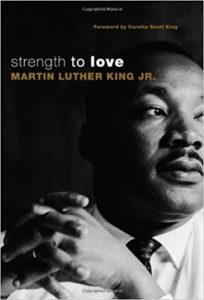 by Martin Luther King, Jr, a collection, which in 1963, published the text of fifteen sermons delivered by Martin Luther King, Jr. What really struck me most after reading each and every one of these sermons is that we often forget that before he was a civil rights leader, MLK Jr was first a Christian and a pastor and that is perhaps what led to his nonviolent approach to protest and disobedience – and how his example truly changed people’s minds. MLK Jr died in 1968 at the age of 39.
by Martin Luther King, Jr, a collection, which in 1963, published the text of fifteen sermons delivered by Martin Luther King, Jr. What really struck me most after reading each and every one of these sermons is that we often forget that before he was a civil rights leader, MLK Jr was first a Christian and a pastor and that is perhaps what led to his nonviolent approach to protest and disobedience – and how his example truly changed people’s minds. MLK Jr died in 1968 at the age of 39.
When I read each of these sermons, I was also really amazed by how spiritually gifted and insightful he was – especially at such a young age. Many of these sermons were given in his early to mid-30s. This is a short book, with short chapters. I recommend buying it and keeping by your bedside and read about one per sitting and just reflect on the message of each one. That was my approach and I think I will certainly re-read many of these sermons over and over again throughout the years and strive to live by their message.
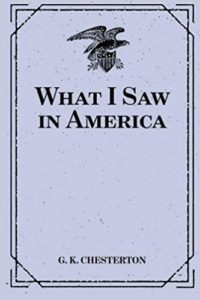 What I Saw in America by G.K. Chesterton, is a book he published in 1922, based on experiences he had in the United States during a lecture tour he did there the previous year. As he says in the early part of the book, “Travel ought to combine amusement with instruction, but most travellers are so much amused that they refuse to be instructed.” This book is filled with similar insight mixed with humor and his own perspective toward life and culture. He notes that “America is the only nation in the world that is founded upon a creed.” He spends a lot of his time in the bigger cities, particularly New York, but also gives commentary on Washington DC and Oklahoma City, on hotels, on the lights of Broadway, on the biases in the press, and on many comparisons between America and England, and the future of democracy. His commentary that “Americans have nationalities at the end of the street which for us (in England) are at the ends of the earth,” is interesting because we certainly are a melting pot.
What I Saw in America by G.K. Chesterton, is a book he published in 1922, based on experiences he had in the United States during a lecture tour he did there the previous year. As he says in the early part of the book, “Travel ought to combine amusement with instruction, but most travellers are so much amused that they refuse to be instructed.” This book is filled with similar insight mixed with humor and his own perspective toward life and culture. He notes that “America is the only nation in the world that is founded upon a creed.” He spends a lot of his time in the bigger cities, particularly New York, but also gives commentary on Washington DC and Oklahoma City, on hotels, on the lights of Broadway, on the biases in the press, and on many comparisons between America and England, and the future of democracy. His commentary that “Americans have nationalities at the end of the street which for us (in England) are at the ends of the earth,” is interesting because we certainly are a melting pot.
With all the recent commentary on biased journalism and “fake news,” I thought Chesterton’s commentary on the press from a century ago was quite remarkable, if not familiar: “The few really untrue and unscrupulous things I have seen in American ‘stories’ have always been in the headlines. And the headlines are written by somebody else; some solitary and savage cynic locked up in the office, hating all mankind, and raging and revenging himself at random, while the neat, polite, and rational pressman can safely be let loose to wander about the town.” He then goes after what one might call the corporate media and says that “the evil in journalism is not in the journalists. It is not in the poor men on the lower level of the profession, but in the rich men at the top of the profession; or rather in the rich men who are too much on top of the profession even to belong to it.” As you can see, this book is more than simply about America, but it is also a lot about the thoughts Chesterton had while in America and encountering Americans. I laughed, I chuckled, and I gained much insight, from his perspective in our country a hundred years ago.
American Pravda: My Fight For Truth in the Era of Fake News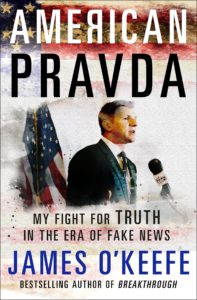 by James O’Keefe. This book was written by one of my very close friends and released in January of this year. It really documents how truly harmful the news media is in our country, no matter your perspective. It showcases the way the media deceives and manipulates – and how they have an agenda. More than anything, James shows the differences between the citizen journalist and the corporate media, something not far off of what G.K. Chesterton was talking about a century ago.
by James O’Keefe. This book was written by one of my very close friends and released in January of this year. It really documents how truly harmful the news media is in our country, no matter your perspective. It showcases the way the media deceives and manipulates – and how they have an agenda. More than anything, James shows the differences between the citizen journalist and the corporate media, something not far off of what G.K. Chesterton was talking about a century ago.
American Pravda also reads like a spy thriller – except it’s the true, daily life of that man of mystery James O’Keefe. And I should know, as I was the Chairman of the board of his Project Veritas for its first four years and this book also reminds me of why I had to get off the board about four years ago. That kind of courage is only endurable for so long. My hat is off to my good friend and his tireless efforts not only to expose corruption everywhere, but to expose the media’s lack of ability (or interest) in doing so. If you want to understand the media today, READ THIS BOOK. Also, I highly recommend listening to the AUDIO version, which James reads himself. It was super cool to hear my friend of 13 years read this book. It was as if he was sitting right there reading it to me. What a fun read but what an exhausting life he leads on behalf of sticking up for average citizens everywhere.
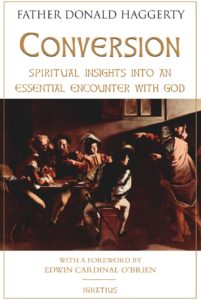 Conversion: Spiritual Insights Into An Essential Encounter With God by Father Donald Haggerty, published in 2017, is a great book for those who are already believers in Christ, and particularly in the Catholic Church, and who are willing to dive deeper into their faith. For, as Father Haggerty puts it in the opening chapter, “The aftermath of a conversion is as significant as the conversion itself.” He talks about having a “second conversion” to draw ourselves deeper into the Church, into the Eucharist, into our prayer life. He uses the examples of so many saints and brings their words alive for us. There are many lessons from this book. One is that God is at work in our lives, in ways we need to realize we are not in control of. But, on the other hand, once God invites us, we need to take the next steps towards our second conversion, to be active in pursuing our faith. This book is a great help towards that and there are many references in it that I will continue going back to as I continue to strive for my own essential encounter with God.
Conversion: Spiritual Insights Into An Essential Encounter With God by Father Donald Haggerty, published in 2017, is a great book for those who are already believers in Christ, and particularly in the Catholic Church, and who are willing to dive deeper into their faith. For, as Father Haggerty puts it in the opening chapter, “The aftermath of a conversion is as significant as the conversion itself.” He talks about having a “second conversion” to draw ourselves deeper into the Church, into the Eucharist, into our prayer life. He uses the examples of so many saints and brings their words alive for us. There are many lessons from this book. One is that God is at work in our lives, in ways we need to realize we are not in control of. But, on the other hand, once God invites us, we need to take the next steps towards our second conversion, to be active in pursuing our faith. This book is a great help towards that and there are many references in it that I will continue going back to as I continue to strive for my own essential encounter with God.
The Last Lion: Winston Spencer Churchill, 1874-1932 by William Manchester. This is volume one (published in 1983) in a great three-part series about Winston Churchill’s life. I listened to this book on Audible – it’s a journey of 40 hours (or 973 pages in print!) and it details about every part of Churchill’s early life, from his childhood, his early and formal education, his early career as a writer, his interest in painting, his struggles to know his parents (his mother got around and his father was mostly absent and died while he was in school), his travels throughout the British Empire and to the United States, and his time entering the parliament. The book ends between the two world wars, with many believing Churchill’s career had already peaked.
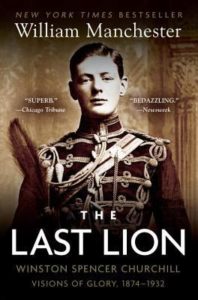 Perhaps the best part about this book is that, to me, it was more than a biography of Churchill. It was also a history of the world he lived in. Manchester spends a lot of time providing us with context. Churchill was born into a world where the British Empire dominated that world. But he also lived during a time of decline for the Empire, and for the clash with colonies in Africa and in India, as well as with Germany and Russia. We get insights into Churchill’s changing views on domestic and foreign policy, his championing of free trade and the free market, his concern for the poor and interest in government programs that provided a safety net, as well as his concern for the rise of socialism and communism and allusions to his ultimate fight against it. This book is a masterpiece, but it’s not for the faint of heart. It’s daunting, but it’s also filled with so many gems of Churchill quotes, all provided directly within the context he lived.
Perhaps the best part about this book is that, to me, it was more than a biography of Churchill. It was also a history of the world he lived in. Manchester spends a lot of time providing us with context. Churchill was born into a world where the British Empire dominated that world. But he also lived during a time of decline for the Empire, and for the clash with colonies in Africa and in India, as well as with Germany and Russia. We get insights into Churchill’s changing views on domestic and foreign policy, his championing of free trade and the free market, his concern for the poor and interest in government programs that provided a safety net, as well as his concern for the rise of socialism and communism and allusions to his ultimate fight against it. This book is a masterpiece, but it’s not for the faint of heart. It’s daunting, but it’s also filled with so many gems of Churchill quotes, all provided directly within the context he lived.
Suicide of The West: How the Rebirth of Tribalism, Populism, Nationalism, and Identity Politics Are Destroying American Democracy by Jonah Goldberg. Released this past April, Suicide Of The West shot to #4 on the New York Times bestseller list and I believe it will go down as a conservative classic. However, this book is not just for conservatives. It’s for everyone. It guides the reader on a journey through time. It’s hard to argue with Jonah’s pronouncement that we are truly living in a “miracle” moment in history, where liberty and prosperity have reached their zenith, a time when billions of people have been pulled out of poverty over a really short period. This “miracle” happened about three hundred years ago, starting in England and transforming itself in America. What this hefty (but page-turning) read of a book really leaves me with is a sense of gratitude for the miracle of America and the West and how fortunate we are to live during these times.
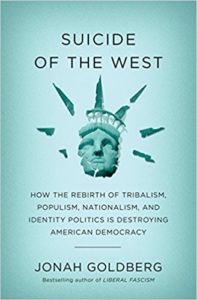 As Jonah shows, most of human history has been filled with extreme poverty, violence, and short life spans. On top of that, most of human history was tribal, and so, our natural human instinct remains tribal. We want to be in groups, and so identity politics, is what we are naturally reverting back to. It’s not progressive, it’s regressive. On the flip side, capitalism and democracy are not natural and so it’s a lot tougher to keep up. Jonah reminds us that when Ronald Reagan said “freedom is always one generation away from extinction,” this is sort of why he was right about that. Freedom takes a lot to defend, it takes a lot of arguments, and it takes a lot of energy and intellect to move beyond our tribal nature. The natural human instinct is security and safety and that is mostly found in the tribe. We seek shelter from freedom because it’s kind of a scary world out there. What we need to teach every generation is gratitude. Instead, what we tend to teach is the opposite: entitlement. Despite the title, this book can be hopeful. Jonah reminds us why this book’s title is not “death of the west” or “fall of the west.” Suicide is a choice – and this book is a wake-up call that we haven’t been making the right choices lately. Perhaps if more people grasp the concepts presented in this book, we’ll avoid the suicide of the West.
As Jonah shows, most of human history has been filled with extreme poverty, violence, and short life spans. On top of that, most of human history was tribal, and so, our natural human instinct remains tribal. We want to be in groups, and so identity politics, is what we are naturally reverting back to. It’s not progressive, it’s regressive. On the flip side, capitalism and democracy are not natural and so it’s a lot tougher to keep up. Jonah reminds us that when Ronald Reagan said “freedom is always one generation away from extinction,” this is sort of why he was right about that. Freedom takes a lot to defend, it takes a lot of arguments, and it takes a lot of energy and intellect to move beyond our tribal nature. The natural human instinct is security and safety and that is mostly found in the tribe. We seek shelter from freedom because it’s kind of a scary world out there. What we need to teach every generation is gratitude. Instead, what we tend to teach is the opposite: entitlement. Despite the title, this book can be hopeful. Jonah reminds us why this book’s title is not “death of the west” or “fall of the west.” Suicide is a choice – and this book is a wake-up call that we haven’t been making the right choices lately. Perhaps if more people grasp the concepts presented in this book, we’ll avoid the suicide of the West.
***
One thing I’ve learned from all these great authors is how well read they are too. That’s one thing you’ll find with great writers: they are also great readers. I have many times heard from great writers that the greatest advice to be a great writer is to be a great reader. All of these authors are well read in their fields. Historical giants such as Winston Churchill and Martin Luther King, Jr. were so well-educated, not simply from school, but self-educated as well and it clearly was part of why they were great leaders – they learned from the experiences of others. 15 books into 2018, and I’ve appreciated more and more why learning is a life-long endeavor. Each book brings a whole new level of enlightenment or way to think about the world and about ourselves.
As of this writing, I completed two books on Florida – “Best State Ever” by Dave Barry and “The Swamp” by Michael Grunwald. I’ll have more to say about those in future posts. 17 books now completed in 2018…onward toward 30 in 2018!
